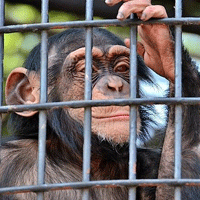 “[T]he concept of legal personhood, that is, who or what may be deemed a person under the law, and for what purposes, has evolved significantly since the inception of the United States,” New York State Supreme Court Justice Barbara Jaffe wrote in her decision denying a petition for a writ of habeas corpus on behalf of two chimpanzees in late July.
“[T]he concept of legal personhood, that is, who or what may be deemed a person under the law, and for what purposes, has evolved significantly since the inception of the United States,” New York State Supreme Court Justice Barbara Jaffe wrote in her decision denying a petition for a writ of habeas corpus on behalf of two chimpanzees in late July.
This petition was the latest in the efforts of the Nonhuman Rights Project (“NhRP”), which has worked for years to achieve legal personhood for animals. Earlier this year, the NhRP brought a petition for a writ of habeas corpus for two 8-year old chimpanzees, Hercules and Leo, housed by Stony Brook University, essentially seeking to compel the university to release the animals to a sanctuary in Florida. Habeas corpus is a centuries-old legal recourse used to address unlawful detention, preserved by the Founding Fathers in Article I, Section 9, Clause 2 of the Constitution. In New York, habeas corpus can only be granted to a person, so granting the relief to Hercules and Leo would essentially determine that the chimpanzees have legal personhood, similar to the way corporations are considered legal persons for certain purposes.
Justice Jaffe first ordered Stony Brook to show cause for holding the chimps in late April, including the term “writ of habeas corpus” in the title of the order, but she amended the order the same day to explicitly remove habeas corpus from the title and emphasize the administrative nature of the order. Animal rights advocates were optimistic about the order compelling the university to defend their possession of Hercules and Leo, especially after the New York Appellate Division affirmed the denial of a writ of habeas corpus for a privately-owned chimpanzee in December 2014. Legal experts have differing opinions on the idea, with some calling Justice Jaffe’s order “a legally sound and suitably cautious step forward” and others declaring that the potential outcome of granting legal personhood to nonhumans “would have tremendous and adverse legal and moral implications for mankind.”
After hearing oral arguments in late May, Justice Jaffe denied the petition, noting that while “[n]ot very long ago, only caucasian male, property-owning citizens were entitled to the full panoply of legal rights under the United States Constitution,” she was bound by the appellate court’s precedent. Further, Justice Jaffe found the state trial court to be an inappropriate venue for deciding such an issue, stating it was better determined in the Legislature or Court of Appeals. NhRP and animal rights advocates remain optimistic, encouraged by Justice Jaffe’s statements that “efforts to extend legal rights to chimpanzees are . . . understandable” and someday “may even succeed.”
The concept of legal rights for animals, great apes in particular, and the efforts to obtain them is not a new phenomenon domestically or internationally. In 2008, the Spanish parliament became the first national legislature to grant legal rights to great apes, and significant changes have occurred worldwide regarding the treatment of chimps and other animal research subjects. Still, the United States is the only developed nation in the world that still allows biomedical experiments on great apes, signaling a reluctance to fully extend certain rights to animals. Advocates will continue to face an uphill legal and philosophical battle in achieving expanded rights for nonhumans.
Meanwhile, Hercules and Leo have now been retired from research at Stony Brook University.
